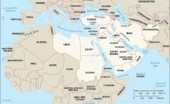Re Ian Bremmer 'Could third-party candidates upend the 2024 US election?' 3 April The current political movement in the USA…
Wednesday Night #821
Written by Diana Thebaud Nicholson // November 26, 1997 // Economy, Misha Crnobrnja, Reports, Wednesday Nights // Comments Off on Wednesday Night #821
The Prologue
As the postal strike continues and we are unable to exchange letters, Wednesday November 26th will be an Alphabet Soup – APEC, IMF, MAI, with a little QSPELL, a dash of PLQ and certainly some NYSE,SEC and even RRSP. For further information, please consult the Website and look for “Soon-come Events”. Not only will you find considerable up-to-date information on APEC and China, you will also (in keeping with the alphabet theme) find several important announcements regarding literary events, including our very own Barry Lazar‘s book signing.
*********************************
A small band of Wednesday Night Regulars braved the storm to partake of alphabet soup (see above).
The evening started with a tour of the latest additions to the Westweb pages, as David pointed out some of the more spectacular pages devoted to “contributors” such as Misha whose pages have links to a wealth of information on the former Yugoslavia and the new states.
The economy and investment
… Lacking representatives of the investment industry, the tour of the markets was blessedly brief, highlighted by quivering charts (created by Nicholson) relayed from the Internet. However, the presence of two prominent international economists ensured a lengthy discussion of the crisis in Asian markets. The nature of the crises varies from country to country. Thailand is a case of regulatory failure; no banks have failed in Singapore; Indonesia’s corruption is so endemic that there seems to be little hope for long-term improvement. The consensus was that in both South Korea and Japan the bailouts of the banks must be largely covered by the taxpayers. We were reminded that all is not bad:
* Productivity remains higher than in the West
* Savings rates are higher (example: In Singapore, by law, workers must have 40% savings rate)
* Japan is just beginning to develop pension funds; the previous lifetime attachment to the employee and the employee’s family ended “about two recessions ago”. However, in both Chinese and Japanese cultures, the tradition of responsibility for the care of the elderly – and the strict hierarchical relationships within families – each generation with its own responsibilities – is an important social strength.
* The West will continue to buy Asian goods, but the state of the stock markets is worrisome.
Enter the International Monetary Fund [IMF] which is in a position to give unpopular advice with great authority. The IMF is the lender of last resort. Intervention to stabilize currency is totally legitimate. The IMF plays the ogre, tells countries what must be accomplished, but does not say how to do it. Governments are actually grateful when they can point to the IMF and say “we have to implement these measures to meet the objectives of tbe IMF”. Remember that the IMF funds come from the member countries and are loans not grants; essentially the IMF is a revolving fund. A question arose as to whether the IMF ever issues bonds (as does the World Bank). It was suggested that the IMF website might answer the question.
David mentioned that there is a new page on the westweb which underlines predictions which have come true. He pointed out that he and others around the table had long ago predicted that the Japanese market values (75 X Earnings) were much too high. The Nikkei has, however, taken seven years to come down.
APEC
We are reminded that the U.S. and Canada promised that the focus at the APEC meeting would be on economics, not politics. Governments cannot decree a perfect world! However, the Canadian Government arrangements certainly enabled the student demonstrations by not providing a sufficient buffer zone. And then, of course, the cameras of the world were focus on how the demonstrators were dealt with. By the same token, several people commented that the students were not creative in their demonstrated opposition; they merely appeared hostile. In conclusion: “If you are not on the Left when you are young, you have no heart; if you are not on the Right when you are old, you have no brain.”
[Macleans: A summit engulfed by crisis Alarm grows over Asia’s worsening financial turmoil BY CHRIS WOOD …There, TV viewers watched in shock on Nov. 24 as the president of Yamaichi Securities broke down in tears while announcing that his 100-year-old institution, Japan’s fourth-largest stock brokerage, was bust.
… The next day, the Nikkei share index lost five per cent of its value and the yen fell to a five-year low against the U.S. dollar; by week’s end, stocks had recovered, but the yen remained shaky. “I would like to make clear,” declared Prime Minister Ryutaro Hashimoto, in Vancouver for the summit of leaders of the Asia-Pacific Economic Cooperation forum, “that Japan’s problems are separate from those of the so-called Asian currency crisis.”]
Yugoslavia
The grip of Yugoslav president Slobodan Milosevic was weakened when a pro-West reformer won presidential elections in Montenegro.
The situation grows more complicated, as Milo Djukanovic beat Milosevic’s protegé, Momir Bulatovic, and pledged to end Milosevic’s monopoly on power. Milosevic’s own power/popularity is diminishing. In the first round of the Serbian presidential elections, the ultra-nationalist radical came in second; in the second round the turnout was less than 50%, so the elections were declared invalid. They will be re-run in December.
Will Milosevic return to the ultra-nationalist radical mode or broker a deal? In Bosnia, the U.S. backed nationalist convert is now perceived as a stooge. All in all, as the nationalists gain power there will be a return to the Right. No good news. No stability.
The key is what will the U.S. do? Will the troops stay on? It seems that Congress is moving in that direction.
What role will Russia play? Russia has too many internal problems and when looking outward, will focus attention on the Middle East, the “5 Stans”, Iraq, OIL – not the Balkans which are only of historic interest and Old historic interest – dating from Peter The Great, not the Communist era.
Keep an eye on other foreign policy initiatives, particularly the “bear hugging” of Japan and China by Yeltsin.
Business Central Europe — Editor’s Note: an excellent source of information – when Misha and Tony are not available – is in the free area of The Economist Web Edition.
Iraq
Why, in 1991, didn’t the U.S. act to remove Saddam? Sanctions don’t remove totalitarian governments. It took 26 years for sanctions to bear fruit in South Africa. Moreover, sanctions lead to ultra-nationalism (viz. Serbia). The population think that the country is being bullied and therefore rally to the Government. Saddam is a singularly nasty piece of work, but we must never forget that he is a superb tactician, therefore compromise in the current arms inspection face-off must be sought. Help could come from the French who are anxious to reestablish their sphere of influence. Ditto the Russians as discussed above.
Remember that the U.S. sided with Iraq in the Iran-Iraq war. These two countries are important counter-weights to one another. But in all of the current concentration on Saddam, attention is drawn away from Syria and another exceptionally wiley politician who is a member of the same party (Baath) as Saddam. He’s very bright and is going to become a problem.
The international embargo against Iraq has caused nearly a million children to suffer from chronic malnutrition since sanctions were imposed in 1990, UNICEF reported Thursday.
It being late, the evening concluded on a somewhat brighter note: An invitation to all to attend the Montreal Press Club evening on December 3rd when Stéphane Dion will be the speaker. Time 6:30. And that was the only mention of local political acronyms.



